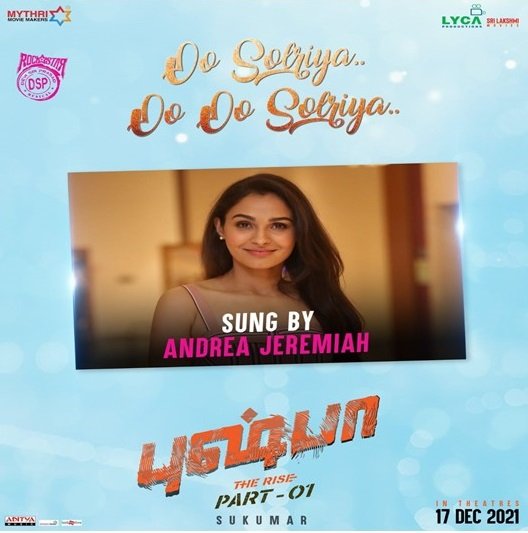Read in : தமிழ்
O Solriya Mama song from the movie Pushpa starring Allu Arjun is trending in Tamil Nadu. It has become a YouTube sensation ever since it was released. Apart from Samantha shaking a leg and Andrea singing, the song is being talked about for its lyrics penned by Viveka. Some organizations in Hyderabad and Tamil Nadu have demanded a ban on the song for demeaning men. Young people are celebrating it for its boldness.
O Solriya says all that moves men is animal lust towards the women no matter how the women dress, behave or look. While Tamil film songs routinely stereotype women and carp about her faithlessness, O Solriya apparently reverses the peeve. O Solriya does stereotype men. So what?
The song Elanthapazham from Panama Pasama in 1968 created a flutter back then. The song penned by Kannadasan was a mega hit. Women frowned on the song with raunchy lyrics and suggestive dance movements. By the way, Vijaya Nirmala, who danced for the song, rose to become one of the most successful women directors in Tamil cinema.
While Tamil film songs routinely stereotype women and carp about her faithlessness, O Solriya apparently reverses the peeve. O Solriya does stereotype men
Tamil songs – especially duets – have typically flirted with obscenity. Such songs centered on a woman’s body have been hugely successful too.
During the 80s, ‘Ennadi Muniyamma’ sung by T K S Natarajan was popular. Atha Petha Malliya Poovu sung by Natarajan in the film Pei Veedu was another chartbuster. Both songs having a folk basis are known for their raunchy descriptions of man – woman relationships.
Elantha Pazham and Ennadi Muniyamma were trendsetters. The 1990s saw a wave of obscenity hit Tamil cinema. Lyricist Vali took the trend to a whole new level with Eppadi Eppadi Samanchathu Eppadi that talks about a girl entering puberty. Vairamuthu matched it with songs like ‘May Matham 98il Major Anene’ in the movie Jay Jay. The song told from a woman’s perspective was similar to O Solriya, but few objected.
Soon item songs that compounded the lyrics and suggestive movements with skimpy clothes became fixtures in most movies.
O Solriya for all its radical take is actually no different. Lyricist Viveka, in an interview, said that men are celebrating this song. He termed it a casual item song and waved away controversies
Reputed lyricists of Kollywood, Vali and Vairamuthu, have faced severe criticism for their overtly explicit lyrics. Analyzing their songs, author Pamaran has penned a book ‘Vali + Vairamuthu = Abasam’ (obscenity).
O Solriya for all its radical take is actually no different. Lyricist Viveka, in an interview, said that men are celebrating this song. He termed it a casual item song and waved away controversies. Actor Allu Arjun also defended this song.
Viveka’s other song Saami Saami in Pushpa is no different from O Solriya. The only difference in O Solriya is that it is presented from a woman’s perspective. Yet, no feminist would like it. The song is like any other item song where a woman’s body is marketed. The reception among men makes it clear that this is a male thing. The female pov is misleading as the lyrics are there to titillate, not educate or lament. They reinforce the idea that boys will be boys, not grown up men, by portraying men as caught in adolescent lust.
Read in : தமிழ்
